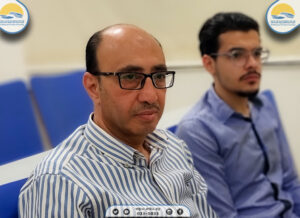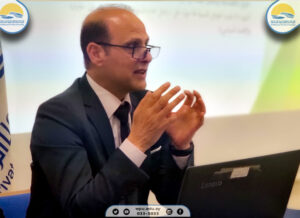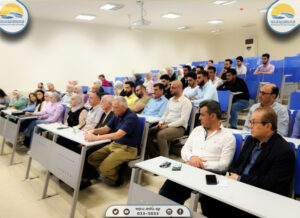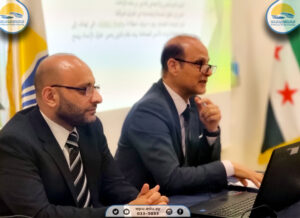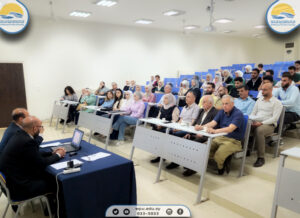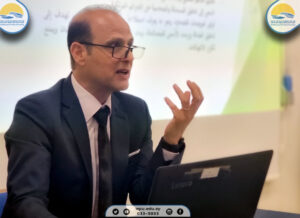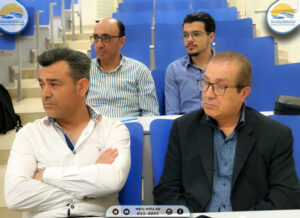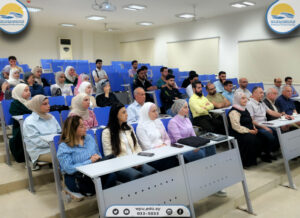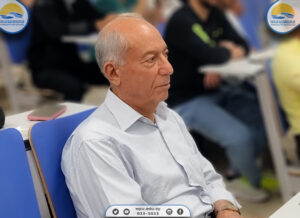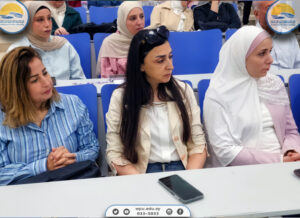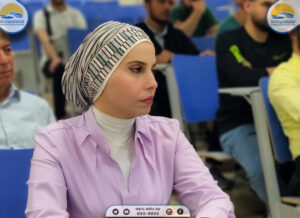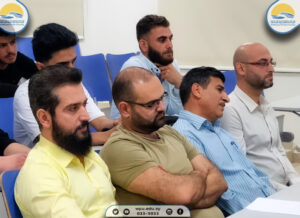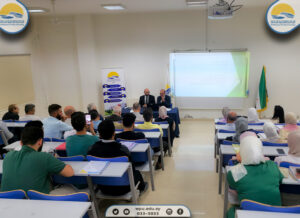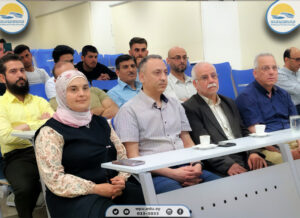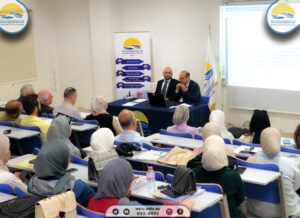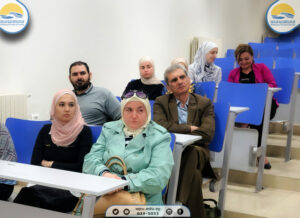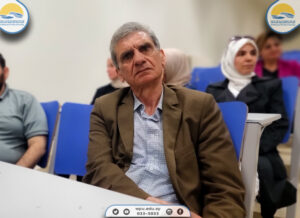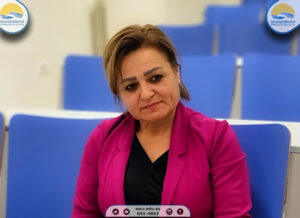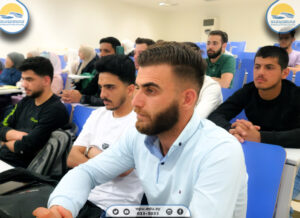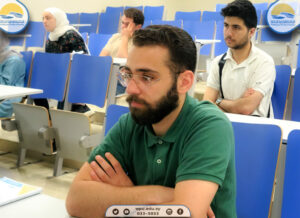الجامعـــة الوطنيـــة الخاصـــة
Al-Wataniya Private University
Al-Wataniya Private University’s Faculty of Administrative and Financial Sciences Hosts Dialogue Seminar on Post-Liberation Reconstruction Challenges
The Faculty of Administrative and Financial Sciences at Al-Wataniya Private University witnessed this morning the launch of a dialogue seminar entitled “(Challenges of Reconstruction in the Post-Liberation Period)”. The seminar was led by Dr. Abdul Hamid Al-Sabbagh, Head of the Business Administration Department, and directly managed and supervised by Dr. Hussein Qusairi, Vice Dean of the Faculty of Administrative and Financial Sciences. The opening session was honored by the presence of Dr. Hazem Milli, Vice President of the University for Academic Affairs, Dr. Hayyan Hamdan, Vice President of the University for Administrative and Student Affairs, Dr. Othman Abdul Qader Naqqar, Vice President of Hama University, and Dr. Abeer Zeidani, Dean of the Faculty of Administrative and Financial Sciences.
The dialogue seminar was primarily addressed to faculty members in the colleges of (Administrative and Financial Sciences, Engineering, Civil Engineering, Architecture and Urban Planning). Dr. Abdul Hamid Al-Sabbagh commenced his address by highlighting the factors that necessitated the initiation of reconstruction, stemming from national responsibility, the increasing level of technological lag, the slowdown in local production, and the flight and shortage of capital. These factors have made reconstruction a vital necessity following the date of December 8, 2025, which marked the dawn of a new era in the future history of Syria.
Regarding the repercussions of the war and its negative consequences at all economic, urban, health, social, and cultural levels, Dr. Abdul Hamid Al-Sabbagh explored the strategies and policies adopted to mitigate the impact of these consequences. These impacts were evident in the decline in the production of manufacturing facilities and its reflection on individual income and the level of demand, alongside the fragmentation of the social fabric and the accompanying destruction of historical and cultural landmarks, as well as the distortion of the demographic and urban reality in the country. This has made reconstruction a broad and comprehensive concept that is not limited to the urban aspect alone but extends to the roots of these effects to address and rectify them, and to prepare for them in more advanced stages.
Dr. Abdul Hamid Al-Sabbagh pointed to the dimensions and principles of reconstruction, which begin with the rebuilding of infrastructure at the level of (road networks, bridges, communication, electricity, and water networks), considering it a starting point for any other process and closely linked to the second dimension, which revolves around economic recovery in all vital sectors. This includes increasing individual income, raising the standard of living, and developing local production, which will reflect on the exchange rate and accelerate the economic cycle. This also necessitates creating job opportunities, attracting foreign capital, and stimulating national investments while ensuring regulations and laws that facilitate their operation, ultimately leading to the need to shape a positive mental image of the state for individuals and society through the restoration and development of governmental and operational institutions and the strengthening of trust between them and society.
In conclusion, the lecturer, Dr. Abdul Hamid Al-Sabbagh, shed light on the most prominent challenges hindering the reconstruction process, including the shortage of material and human capital, and the resulting lack of funding in professional sectors. This urgently requires working to ease economic sanctions, attract funding from international institutions such as the International Monetary Fund and the World Bank, and stimulate private financing. He also discussed the factors of corruption, mismanagement, the absence of political and security stability, and the emigration of intellectuals and qualified individuals, which make reconstruction a significant challenge in the post-war phase.
This dialogue seminar represents a positive and practical step within the framework of disseminating and promoting the concept of reconstruction, while highlighting its import
-
Share
-
Share
-
Share
-
Share
Al-Wataniya Private University
It was established in 2007 and includes six colleges:
for communication:
- Syria - Hama Governorate - International Road Homs-Hama
- 0096334589094
- 00963335033
- info@wpu.edu.sy
- Complaints form
